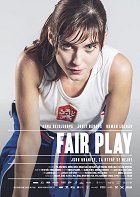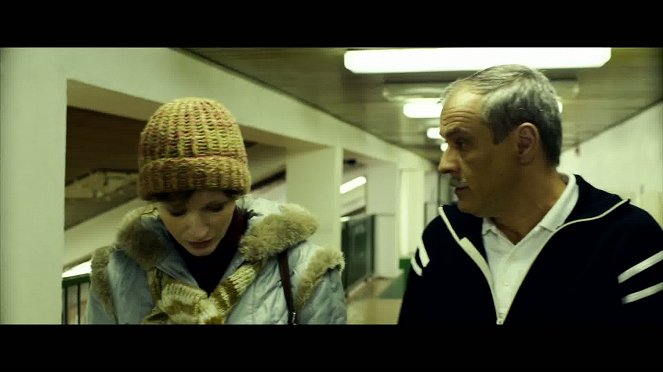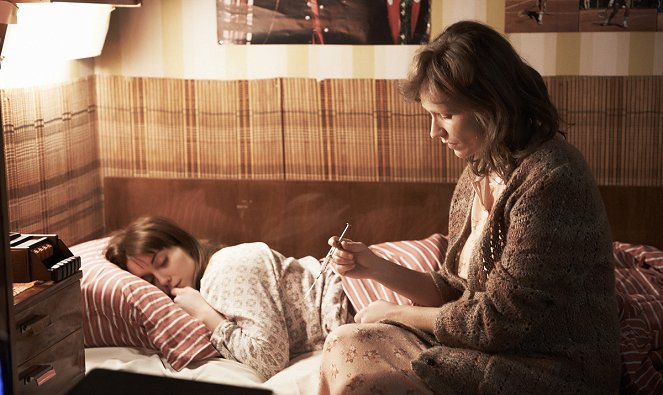Directed by:
Andrea SedláčkováScreenplay:
Andrea SedláčkováCinematography:
Jan Baset StřítežskýCast:
Judit Pecháček, Aňa Geislerová, Roman Luknár, Eva Podzimková, Ondřej Novák, Roman Zach, Igor Bareš, Jiří Wohanka, Ondřej Malý, Taťjana Medvecká (more)Plots(1)
1980's in Czechoslovakia. Young sprinter Anna (Judit Bárdos) becomes a member of The National Sports Centre. Her mother (Anna Geislerova) and her coach (Roman Luknar) hope she will meet requirements of qualification for the Olympics. The only thing which swerves Anna from her world of tough sports drill is her relationship with Tomas (Ondrej Novak). Anna starts unknowingly getting doped with anabolic steroids. Her performance is getting better but at the same time first health problems occur. Anna learns the truth about the drugs and although her participation at the Olympics is at stake she is going to continue in her training without them. However, her mother hopes Anna might use her participation at the Olympics as a mean of immigration and she decides to apply the steroids to Anna secretly, pretending it is nothing but doses of harmless vitamins. (official distributor synopsis)
(more)Videos (2)
Reviews (12)
A very decent attempt to make a great Czech sports film, with excellent performances and a well chosen theme. But one small detail spoils the purely realistic feel of the whole project - the main characters of the plot work in a skillfully reconstructed early 1980s retro, but it's as if no one else existed outside of them at that time. Of course, it is not only the sporting performances of Bárdos and Josefíková that are a joy to behold, and that is what it’s all about. Aňa Geislerová also royally played the role of a mother several years ago and she still has what it takes and is finding new acting roles for herself all the time. For which I thank her again.
()
A very good film with two quite crucial "buts" for me, which I will describe in a slightly spoilerish P.S. Fair Play is filmed with ease, the period atmosphere is good and Judit Bárdos is absolutely great in the lead role. Surprisingly, I also liked Aňa Geislerová this time, who gives a very civil performance. It's a compelling, sad story that wants to make the viewer think, and I hope it will lead as many of them as possible to that conclusion.____Slightly spoilerish P.S.: I didn't like the fact that the mother and the coach didn't also involve the doctor in their plan to secretly administer the stromba to her daughter, because then there would be no risk of her "telling" (which is what happened). I'm also quite fed up with StB plots that always start, run and end the same way.
()
Unlike the main character, the film occasionally raises its knees quite high. And it doesn’t really work the way it's supposed to. Mainly through its occasional abbreviation in the development of Anna and Tomáš's relationship (meeting on the tram?), it undermines the effect of several related scenes, thus unnecessarily undermining the well-constructed dramatic storyline, which is mainly about personal dramas and moral dilemmas. Fortunately, these work on other levels (the coach, the mother). Yes, it will be mentioned many times, the martyr's pedestal that the director puts someone else on every moment is at times too schematic. But fortunately, the strength of the film lies in the performances. Bareš's STB agent, Malý's club doctor and especially Judit Bárdos brings interesting acting charm from Slovakia after a long time. Aňa tries hard, but she is too young a mother in the role that was stamped on the director at Negativ, instead of the intended Ivana Chýlková. Anyway, the film's a pleasant surprise, if only because it wants to come to terms with the recent past and isn't afraid to go its own way.
()
The first of those three films our country produces every year that we can be proud of. The story is simple and its scope and visuals are not as large-format as Burning Bush, but it has similar internal power and even more sensitively captured details. You will be touched and sad, but you will also be glad you’ve seen this.
()
SPOILERS: It's too bad that Andrea Sedláčková paradoxically makes things easier for her characters. Not so much on the level of physicality, which is one of the film's strengths, because the ability of Fair Play to slip into physical intimacy and be an unpleasant experience goes beyond domestic customs. The film is "easy"on a moral level, in which it depicts the failure of characters who either do not know that they are failing (Anna), or failing because they are forced to do so because of good intentions and resistance to the system (the mother). From a certain point of view, Fair Play can come off as a chain of creating an alibi for what could provocatively be a "sick parental ambition" in another context. The film is not so much about doping in socialist sports as it is about (from my perspective) a less probable scenario where anabolic steroids serve as a desperate attempt to escape the dull machinery of normalization. It's nice that Martin's colleague tells Anna "don't take it if it’s not allowed", but Anna doesn't have to deal with this dilemma at all in the end. In fact, there is no one to doubt, because even the mother does it purely in bona fide and eventually symbolically "pays" for it. Fair Play is such a pleasantly digestible soft drama, which is undoubtedly engaging and well-told, cleverly shot, but also extremely descriptive and semantically unambiguous (does the mother still have to throw up by the garbage cans after a suggestive interrogation on Bartolomějská street? Does the director believe so little in the effect of that scene? This is another one of those films where the little guy morally triumphs over the machinery of power, while the failures are secondary and actually only serve to highlight the fair play attitude of the protagonist. I think that this greatly undermines the impact and reach of the testimony. [60%] P. S. I admit that I made my own film in my mind, where the famous fate of the socialist bloc at the LA Olympics would be a cruel joke for the protagonist. It is probably because I am attracted by the fatalistic vision of the recent past, in which the little lies and compromises eventually catch up with the characters.
()



Ads